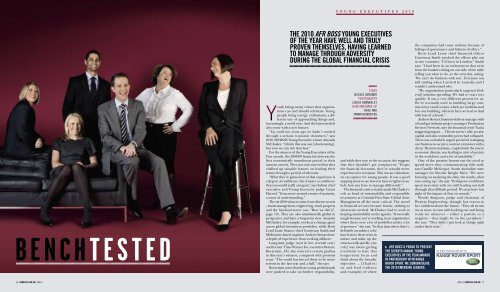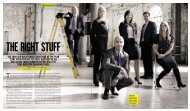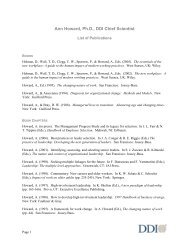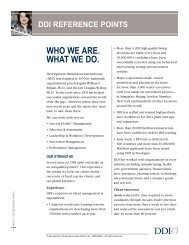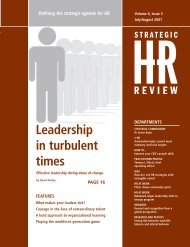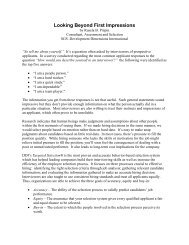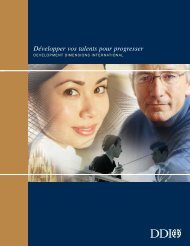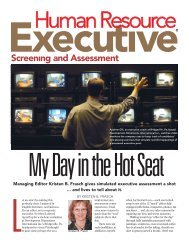to read more - DDI Home
to read more - DDI Home
to read more - DDI Home
You also want an ePaper? Increase the reach of your titles
YUMPU automatically turns print PDFs into web optimized ePapers that Google loves.
y o u n g e x e c u t i v e s 2 0 1 0<br />
BENCHTESTED<br />
The 2010 AFR BOSS Young Executives<br />
of the Year HAVE well and truly<br />
PROVEN THEMSELVES, having learned<br />
<strong>to</strong> manage through adversity<br />
during the global financial crisis<br />
Youth brings many virtues that organisations<br />
can and should celebrate. Young<br />
people bring energy, enthusiasm, a different<br />
way of approaching things and,<br />
increasingly, a world view. And the latest models<br />
also come with a new feature.<br />
“Up until two years ago we hadn’t worked<br />
through a serious economic downturn,” says<br />
2010 AFR BOSS Young Executive winner Amanda<br />
McCluskey. “I think that was one [shortcoming],<br />
but now we can tick that box.”<br />
For the winners of the Young Executives of the<br />
Year awards, the 2008-09 financial crisis was the<br />
first economically tumultuous period in their<br />
nascent careers. They not only survived but they<br />
chalked up valuable lessons on leading their<br />
teams through a period of adversity.<br />
“What they’ve gained out of that experience is<br />
a degree of confidence, but it wasn’t a confidence<br />
that you would [call] arrogant,” says Salmat chief<br />
executive and Young Executive judge Grant<br />
Harrod. “It was <strong>more</strong> around a sense of maturity,<br />
a sense of understanding.”<br />
The six 2010 winners come from diverse sec<strong>to</strong>rs<br />
– funds management, engineering, retail, property<br />
and the fast-food sec<strong>to</strong>r (see “How we did it”,<br />
page 19). They are also unashamedly global in<br />
perspective and have a long-term view. Amanda<br />
McCluskey, for example, works as a change agent<br />
across global investment portfolios, while Bovis<br />
Lend Lease finance chief Courtenay Smith and<br />
Melbourne-based engineer Andrew Stewart have<br />
a depth of experience from working offshore.<br />
Long-time judge (now in her seventh year)<br />
and former Time Warner Inc executive Bonnie<br />
Boezeman, AO, also noticed a certain gravitas<br />
in this year’s winners, compared with previous<br />
years. “The world has forced them <strong>to</strong> be <strong>more</strong><br />
serious in the last year and a half,” she says.<br />
Boezeman notes that these young professionals<br />
were pushed <strong>to</strong> take on further responsibility,<br />
s<strong>to</strong>ry<br />
JESSICA GARDNER<br />
pho<strong>to</strong>graphy<br />
louise kennerley<br />
hair and make-up<br />
rose and<br />
Tammi Hendricks<br />
and while they rose <strong>to</strong> the occasion, she suggests<br />
that they shouldn’t get complacent: “Forget<br />
the financial downturn, they’ve actually never<br />
experienced a recession. This was an education,<br />
an eye-opener for young people. It was a good<br />
stepping s<strong>to</strong>ne <strong>to</strong> see how you have <strong>to</strong> tighten your<br />
belt, how you have <strong>to</strong> manage differently.”<br />
The financial crisis certainly made McCluskey’s<br />
role as head of sustainability and responsible<br />
investment at Colonial First State Global Asset<br />
Management all the <strong>more</strong> critical. The mood<br />
in financial services became frantic, shifting <strong>to</strong><br />
short-term survival. McCluskey had <strong>to</strong> work at<br />
keeping sustainability on the agenda. “It was really<br />
<strong>to</strong>ugh because you’re working in an organisation<br />
where there were a lot of portfolios under a lot<br />
of pressure,” she says. “In that time when there’s<br />
definitely a tendency <strong>to</strong> be<br />
much <strong>more</strong> short term in<br />
nature and make up the<br />
returns really quickly, [my<br />
role] was about getting<br />
everybody <strong>to</strong> have that<br />
longer-term focus and<br />
think about the broader<br />
objectives … [I had <strong>to</strong>]<br />
try and find evidence<br />
and examples of where<br />
AFR BOSS is proud <strong>to</strong> present<br />
the seventh annual Young<br />
Executives of the Year Awards<br />
in partnership with Range<br />
Rover Sport. we congratulate<br />
the 2010 emerging leaders.<br />
the companies had come undone because of<br />
failings of governance and failures of ethics.”<br />
Bovis Lend Lease chief financial officer<br />
Courtenay Smith watched the effects play out<br />
in two countries. “I’d been in London,” Smith<br />
says. “I had been in an environment that went<br />
from the bankers sitting on one side of the table<br />
telling you what <strong>to</strong> do, <strong>to</strong> the next day, saying,<br />
‘We can’t do business with you’. Everyone was<br />
still smiling when I arrived in Australia and I<br />
couldn’t understand why.<br />
“My organisation particularly targeted [federal]<br />
stimulus spending. We had <strong>to</strong> react very<br />
quickly. It was a very different process for us.<br />
We’re normally used <strong>to</strong> building large commercial<br />
or retail centres, which are multi-faceted<br />
but one building, whereas here we had <strong>to</strong> deal<br />
with lots of schools.”<br />
Andrew Stewart, business delivery manager with<br />
oil and gas industry project manager Production<br />
Services Network, says the financial crisis “had a<br />
staggering impact … Clients weren’t able <strong>to</strong> raise<br />
capital and also commodity prices had collapsed.<br />
There was a relatively urgent period of reshaping<br />
our business <strong>to</strong> secure a contract extension with a<br />
client. That internal issue, coupled with the macro<br />
economic climate, was leading <strong>to</strong> a lot of anxiety<br />
in the workforce and a lot of instability.”<br />
One of the greatest lessons was the need <strong>to</strong><br />
spend <strong>more</strong> time communicating with staff,<br />
says Camille McGregor, South Australian state<br />
manager for Sinclair Knight Merz. “We were<br />
focusing on analysing the data, the results, what<br />
was coming up,” she says. “Perhaps we could have<br />
spent <strong>more</strong> time with our staff, leading our staff<br />
through that difficult period. We may have lost<br />
sight of the impact of that on morale.”<br />
Wendy Simpson, judge and chairman of<br />
Westray Engineering, though, has reason <strong>to</strong><br />
be confident about the future. “They all struck<br />
me as <strong>more</strong> in tune with looking out and being<br />
<strong>read</strong>y for whatever – either a positive or a<br />
negative – that might be on the periphery,”<br />
she says. “They didn’t just look at things right<br />
under their nose.”<br />
IN PARTNERSHIP WITH<br />
RANGE ROVER SPORT<br />
16 ❘ afrboss.com.au ❘ jun.10 jun.10 ❘ afrboss.com.au ❘ 17
y o u n g e x e c u t i v e s 2 0 1 0<br />
Armando Da Silva Pedruco, 33<br />
national operations manager, Dick Smith<br />
Men<strong>to</strong>r: Marty Hamnett, former GM,<br />
supermarket operations, Woolworths<br />
Pedruco was just a few months old when his<br />
parents fled unrest in East Timor by boat and arrived<br />
in Darwin. After finishing high school he started on the<br />
shop floor of electronics retailer Dick Smith in 1996.<br />
Two years later he became s<strong>to</strong>re manager and has<br />
worked his way up <strong>to</strong> national operations manager, a<br />
role he has held since 2008. Pedruco is responsible for<br />
356 s<strong>to</strong>res and 3800 staff nationally. He is studying for<br />
an MBA at Macquarie Graduate School of Management<br />
as part of a Woolworths scholarship program.<br />
Sacrifices: I learned very young that if I wanted<br />
my life <strong>to</strong> be worth the sacrifices my parents had<br />
made, I had <strong>to</strong> work twice as hard as those around<br />
me. When my first son was born I didn’t spend enough<br />
time at home with him. At that time I was an area<br />
manager and things were pretty hectic. I was trying <strong>to</strong><br />
get ahead in life. The turning point for me was when<br />
we started having our second and third child I realised<br />
the time I never gave my first child. [He and his wife<br />
now have four children.]<br />
Corporate life: Every time I’ve got a new role,<br />
the first thing that comes <strong>to</strong> you is self-doubt. To go<br />
from a s<strong>to</strong>re manager <strong>to</strong> an area manager, it’s a big<br />
jump. You’ve got <strong>to</strong> prove <strong>to</strong> yourself that you can do<br />
the job. You’ve just got <strong>to</strong> get yourself over the line. I<br />
think you need <strong>to</strong> set yourself some short-term goals<br />
– <strong>to</strong> try and achieve something out of your first 100<br />
days. I learned that mistakes will be made but <strong>to</strong> take<br />
responsibility and move quickly <strong>to</strong> respond <strong>to</strong> them.<br />
Benefits of being young: Being able <strong>to</strong><br />
balance and understand different generations. I think<br />
you’re down <strong>to</strong> Earth with the young kids coming up.<br />
They don’t see you as an old fella; they see you as<br />
one of them. But at the same time, people who are a<br />
bit older respect you when you’re [in your] early 30s<br />
because you’re not a young kid.<br />
Camille McGregor, 35<br />
State manager – South Australia, Sinclair Knight Merz<br />
Men<strong>to</strong>r: Dr Nick Fleming, chief sustainability officer, SKM<br />
McGregor grew up in rural Vic<strong>to</strong>ria and started with<br />
engineering firm Sinclair Knight Merz as a graduate<br />
environmental scientist in Bendigo in 1999. After 11 years<br />
with the firm, she oversees 150 staff and is responsible for<br />
business strategy development and implementation in SA.<br />
McGregor holds an arts and science degree and completed<br />
a master of environment in 2006 while working full time.<br />
Men<strong>to</strong>ring: I men<strong>to</strong>r lots of grads, but the most<br />
rewarding thing is where we’re bringing new people in<strong>to</strong><br />
the business that have either worked in government or at<br />
a smaller consulting business. I see my role as facilitating<br />
their integration in<strong>to</strong> SKM and helping them navigate<br />
the organisation. It can be quite a challenging thing for<br />
somebody <strong>to</strong> come in<strong>to</strong> an organisation of 6000 people<br />
and wonder, “How do I make this or that happen’ I see<br />
myself as an enabler.<br />
Lesson: It became evident <strong>to</strong> me that throughout my<br />
technical career, the approach we <strong>to</strong>ok was <strong>to</strong> dive straight<br />
in<strong>to</strong> a problem. Then I realised you can’t always apply that<br />
same approach when dealing with people issues. We’d<br />
gone through a 360-degree [feedback process]. I was quite<br />
shocked <strong>to</strong> hear that I needed <strong>to</strong> have <strong>more</strong> empathy in my<br />
interactions with people. I was conditioned <strong>to</strong> jump straight<br />
<strong>to</strong> solution or straight <strong>to</strong> task, but [leadership] is about<br />
being able <strong>to</strong> listen and <strong>to</strong> coach or bring people <strong>to</strong> their<br />
own solutions. It was a big learning curve for me.<br />
McCluskey is responsible for imbedding sustainability<br />
principles across the asset manager’s $150 billion global<br />
investment portfolio. A keen environmentalist, she decided<br />
advocating change from within the corporate world<br />
was <strong>more</strong> her style after missing her Sydney University<br />
graduation <strong>to</strong> attend a protest (she studied economics<br />
and international relations). McCluskey is one of the most<br />
influential change agents in the Australian investment<br />
community. She was founding deputy chair of the Inves<strong>to</strong>r<br />
Group on Climate Change, is on the board of the Great<br />
Barrier Reef Foundation and is involved with United Nations<br />
initiatives on responsible investment. Prior <strong>to</strong> joining<br />
Colonial in 2007, she managed a sustainability focused<br />
equities trust for Portfolio Partners and has held other<br />
financial services roles since 2001. An enthusiastic cyclist,<br />
she also has interests in indigenous affairs after spending<br />
six weeks working on secondment in Cape York.<br />
Challenges: Every day I work <strong>to</strong>wards addressing<br />
what I see as a massive market failure: the failure of<br />
mainstream inves<strong>to</strong>rs <strong>to</strong> consider the environmental,<br />
social and governance issues that impact investment<br />
returns. The big challenges are around perceptions of<br />
Amanda McCluskey, 33<br />
head of sustainability and<br />
responsible investment, Colonial<br />
First State Global Asset Management<br />
Men<strong>to</strong>rs: Fergus Neilson, CEO,<br />
Babcock & Brown Direct<br />
Investment Fund; Neil Cochrane,<br />
former deputy CEO, Colonial First<br />
State Global Asset Management<br />
what sustainability issues are. People think that you’re<br />
going <strong>to</strong> compromise their performance or make it harder <strong>to</strong><br />
invest, but really what you’re doing is helping them make<br />
better investment decisions and think about all the broader<br />
issues that can impact performance.<br />
How do you build credibility: Doing the research,<br />
doing the hard work of crunching the numbers yourself when<br />
you’re trying <strong>to</strong> find new investment opportunities, and trying<br />
<strong>to</strong> identify things that people haven’t thought of.<br />
Corporate life: I love the subject matter I work on. And<br />
the opportunity <strong>to</strong> try <strong>to</strong> lead an industry <strong>to</strong> look at some of<br />
the broader issues that impact company performance.<br />
Lessons: Collaboration. You can’t be a leader on your own.<br />
You can achieve things on your own, but you have <strong>to</strong> work<br />
with people <strong>to</strong> get a good organisational outcome. I learned<br />
this by trying <strong>to</strong> do <strong>to</strong>o much myself. You realise when you<br />
hear yourself saying the same things over and over again,<br />
you’re probably not bringing people along on the journey with<br />
you. If you make people feel like it’s their message it makes<br />
your life so much easier.<br />
how we did it<br />
AFR BOSS Young Executives entrants were asked<br />
<strong>to</strong> submit details of major career achievements and<br />
leadership roles, and <strong>to</strong> provide examples of workplace<br />
dilemmas and how they responded. Entrants had <strong>to</strong> be<br />
aged 35 years or under. A shortlist of 11 finalists was<br />
chosen from scores of entries received from around the<br />
country. The candidates were then interviewed by our<br />
judging panel and put through a one-day assessment<br />
by talent management experts Development Dimensions<br />
International (<strong>DDI</strong>), who examined their ability <strong>to</strong> handle<br />
changing scenarios in a realistic, simulated business<br />
environment. The final six were chosen based on the<br />
judges’ decision and <strong>DDI</strong> results. Potential conflicts of<br />
interest are disclosed during the judging process.<br />
WHAT IT TAKES<br />
What makes an ideal young leader According <strong>to</strong> research<br />
by <strong>DDI</strong>, winners tend <strong>to</strong> be:<br />
AMBITIOUS: But they retain a balance between their<br />
ambition and arrogance. They are comfortable with their<br />
assessment of a situation.<br />
DECISIVE: They aren’t afraid of making decisions at an<br />
operational, tactical and strategic level. They don’t hesitate<br />
<strong>to</strong> take action and responsibility for driving change, and can<br />
handle lots of information from a variety of perspectives.<br />
BRAVE: They are confident enough <strong>to</strong> walk in<strong>to</strong> a<br />
boardroom or situation and hold their own. To do this they<br />
need <strong>to</strong> be flexible, knowledgeable and have impact.<br />
EMPOWERING: They have the ability <strong>to</strong> push decisionmaking<br />
downwards. They promote other people’s ownership<br />
while still providing guidance and support <strong>to</strong> their team.<br />
ENTREPRENEURIAL: They seek out innovative solutions<br />
<strong>to</strong> problems, challenge set paradigms, and reject the status<br />
quo. They focus on external drivers, not just internal ones.<br />
VISIONARY: They are able <strong>to</strong> set strategic direction and<br />
understand the short- and long-term issues. They tend <strong>to</strong> be<br />
innovative and are able <strong>to</strong> put guidelines in place <strong>to</strong> set the<br />
pace of change and make things happen.<br />
WHAT THEY FACE<br />
Shifting from an operational <strong>to</strong> a strategic role is one of<br />
the most difficult personal challenges for rising executives,<br />
<strong>DDI</strong> managing direc<strong>to</strong>r Bruce Watt says. Others are:<br />
An exponentially broadened scope of business, often<br />
taking responsibility for large portions of the enterprise.<br />
Heading a senior leadership team while also grooming<br />
<strong>to</strong>morrow’s future leaders.<br />
Navigating internal politics and building partnerships<br />
with boards, analysts and key cus<strong>to</strong>mers.<br />
Increased pressure stemming from tremendous<br />
consequences of failure.<br />
Feelings of isolation (it’s lonely at the <strong>to</strong>p).<br />
18 ❘ afrboss.com.au ❘ jun.10 jun.10 ❘ afrboss.com.au ❘ 19
y o u n g e x e c u t i v e s 2 0 1 0<br />
Joanne Taylor, 32<br />
vice-president regional<br />
manager NSW/ACT, McDonald’s Australia<br />
Men<strong>to</strong>r: Frank McManus, former senior<br />
vice-president, direc<strong>to</strong>r of people resources<br />
Taylor has made a successful transition from human<br />
resources <strong>to</strong> operations. She has been with McDonald’s for<br />
six years, starting as direc<strong>to</strong>r of employee relations in 2004.<br />
In 2006 she was made direc<strong>to</strong>r, franchise NSW/ACT. She<br />
drives the strategy for 291 franchised and company-owned<br />
s<strong>to</strong>res, which employ about 23,000 crew and managers.<br />
Prior <strong>to</strong> McDonald’s, Taylor held HR positions at Star City<br />
Casino and the Australian Industry Group.<br />
Lessons from the global financial crisis:<br />
It was a bit of a warning bell for everyone within the<br />
organisation <strong>to</strong> say times won’t be fantastic forever. The<br />
GFC did send a signal <strong>to</strong> everyone that we also need <strong>to</strong><br />
be preparing for the rainy day. So reducing debt and<br />
being mindful of what else we need <strong>to</strong> be doing <strong>to</strong>day and<br />
<strong>to</strong>morrow <strong>to</strong> stay one step ahead of our competi<strong>to</strong>rs.<br />
Challenges: Typically the [operational] role has been<br />
performed by people who have been with the organisation a<br />
period of time and have worked their way through. Ensuring<br />
that I had credibility with both licensees and company<br />
employees [was a challenge]. I did that by not trying <strong>to</strong><br />
pretend when I didn’t have the knowledge and by also<br />
making sure people recognised the skills that I was bringing.<br />
[I built credibility by] spending some time in s<strong>to</strong>res, learning<br />
the crew stations and also spending time learning how we<br />
assess the restaurant. Also, just <strong>read</strong>ing a lot of materials,<br />
getting across it, making sure you know the lingo.<br />
Do you have a BlackBerry Yes. It never goes off.<br />
Early [on] you become managed by the device, rather than<br />
you managing with it. I think I’ve gotten better with time.<br />
It’s a <strong>to</strong>ol <strong>to</strong> make my job easier and while it’s on all the<br />
time in case there’s an emergency, I shouldn’t be attached<br />
<strong>to</strong> it because I’ve got <strong>to</strong> have a break. It’s really just<br />
knowing when <strong>to</strong> turn it off or getting out of the trap of<br />
thinking that you have <strong>to</strong> reply immediately just because<br />
you’ve received an email.<br />
Demands of corporate life: The energy that you<br />
need <strong>to</strong> convey at all times being in a leadership role. It<br />
<strong>to</strong>ok me a while <strong>to</strong> realise how much people look <strong>to</strong> you for<br />
inspiration and advice. I think we probably underestimate<br />
the impression that [we] convey. There’s a lot of pressure<br />
<strong>to</strong> be “on” all the time. You can’t have a bad day and go,<br />
“Sorry, I don’t feel like it <strong>to</strong>day” because you are the face.<br />
Andrew Stewart, 33<br />
business delivery manager, Production Services Network<br />
Men<strong>to</strong>r: Paul Tuck, manager of engineering, Australia, PSN<br />
Since 2009, Stewart has been responsible for a<br />
team of 300 people delivering projects for oil company<br />
ExxonMobil in Bass Strait. His direct reports include<br />
project management, engineering, procurement and<br />
construction. He joined PSN as the economy was turning<br />
down and just as the business was going through a<br />
period of reshaping <strong>to</strong> secure a contract extension.<br />
Prior <strong>to</strong> this role he was an engineer at Aker Solutions<br />
for seven years, leading projects in the oil and gas and<br />
mining industries in Australia and working on projects in<br />
the United Kingdom, the Netherlands and India. Stewart<br />
holds an honours degree in mechanical engineering and<br />
an MBA from Melbourne Business School. He and wife<br />
Nerida have a baby son.<br />
<strong>to</strong>ugh decision: A project site had <strong>to</strong> be closed,<br />
leading <strong>to</strong> 35 redundancies. Opponents wanted me<br />
<strong>to</strong> avoid the decision and effectively sponsor an<br />
unjustifiable part of the operation. The dilemma was<br />
compounded by whether <strong>to</strong> advise the team four weeks<br />
from the demobilisation date or at the time I made the<br />
call, giving everyone four months notice and potentially<br />
having <strong>to</strong> manage early resignations. The basis was<br />
clear: operate a competitive business and provide team<br />
members with complete information so they can act in<br />
the best interests of their livelihoods.<br />
Job lay-offs are the hardest thing you have <strong>to</strong> do.<br />
You’re comparing the hard-line profit with your empathic<br />
values. How I rationalise that internally, is that when you<br />
run a business you can’t afford <strong>to</strong> be sponsoring divisions<br />
within, because that’s <strong>to</strong> the detriment of the overall<br />
business. You have <strong>to</strong> keep a sharp pencil and at times<br />
you have <strong>to</strong> make <strong>to</strong>ugh but human calls.”<br />
Global lessons: It was really <strong>to</strong>ugh working<br />
in Mumbai. I was working for a large multinational<br />
company; they were very demanding on their quality<br />
expectations and it was a completely different<br />
mindset from the industry in India. The team I was<br />
running was purely Indian locals.<br />
The Western business way of working is very<br />
abrasive. There’s a lot of transparency, performance<br />
metrics and roles and responsibilities. In India, the<br />
approach is quite different. Accountability is <strong>more</strong><br />
collectively distributed. That’s <strong>to</strong>ugh, because when<br />
you’re working in the oil and gas industry it’s all around<br />
hard results, on time, on budget.<br />
Future: I’d love <strong>to</strong> be a key part of an organisation<br />
whether that’s CEO or direc<strong>to</strong>r or general manager<br />
sort of level. I’m certainly ambitious. [It will take]<br />
getting diverse experiences as I progress through an<br />
organisation and through my life. Diverse experiences<br />
but underpinned by performance, because you’re only<br />
as good as your last role.<br />
Changes in the corporate world: There’s<br />
a lot <strong>more</strong> emphasis on emotional intelligence. When I<br />
joined the game nearly 10 years ago, it was <strong>more</strong> around<br />
intellectual capacity and intelligence.<br />
Courtenay Smith, 33<br />
chief financial officer, Bovis Lend Lease Australia<br />
When Smith was growing up in Mudgee, NSW, she<br />
wanted <strong>to</strong> be a marine biologist and save the Great<br />
Barrier Reef. Instead she studied accounting and her<br />
career in finance has taken her <strong>to</strong> three different<br />
countries. Over the past 12 years Smith has held<br />
six roles within the Lend Lease group, in London,<br />
Singapore and Australia. She has been CFO of its project<br />
management and construction business Bovis Lend<br />
Lease since January 2009. On her watch, the Australian<br />
arm of Bovis Lend Lease delivered some of its best ever<br />
results (Asia-Pacific revenue of $3 billion and <strong>more</strong> than<br />
$90 million net profit in 2009). Outside of work Smith is<br />
an advanced open-water diver and has completed the<br />
Oxfam 100-kilometre Trailwalker three times.<br />
Job loyalty: It’s pretty important although people’s<br />
attitudes <strong>to</strong>wards it have changed a lot. We’re in an<br />
environment where people operate quickly. They can<br />
treat their work life like that <strong>to</strong>o. I don’t think that I<br />
would have been here for 12 years in the same job. I’ve<br />
had different jobs in that time. You need people that<br />
are going <strong>to</strong> stay in a role for a longer time <strong>to</strong> make sure<br />
there’s stability but you also need people that are willing<br />
<strong>to</strong> move around and drive change.<br />
Turning point: I was 23 when one of our CFOs came<br />
back from Singapore and said, “There’s a role up there,<br />
do you want <strong>to</strong> go” I hadn’t thought about working<br />
offshore. I was still interested in socialising and all those<br />
things. I said why not That was a huge point for me. I was<br />
thrown in<strong>to</strong> the deep end. Lend Lease had just acquired<br />
Bovis. In Asia, we went from a four-country business <strong>to</strong><br />
an 11-country business overnight. I was in an accounting<br />
role at the time but I had <strong>to</strong> step up.<br />
Difficult decision: In the UK, I had <strong>to</strong> pretty<br />
much change over an entire finance team. When you’re<br />
making decisions about individuals it’s difficult, but I went<br />
through a process of trying <strong>to</strong> see if they could succeed<br />
or not. I spent a lot of time talking <strong>to</strong> my manager about<br />
those decisions and reflecting on the right things [<strong>to</strong><br />
do]. I checked in with the individuals involved <strong>to</strong> make<br />
sure that I wasn’t making the wrong decisions and that<br />
my assessment of them was correct. In the end I had an<br />
entire new finance team <strong>to</strong> manage and set up, which was<br />
a good thing, but it was a difficult process <strong>to</strong> go through.<br />
The judges<br />
Bonnie Boezeman, AO, (centre) has been a judge of the awards since 2004. She is<br />
chairman of PayPal Australia, deputy chairman of NSW Lotteries and is a non-executive<br />
board direc<strong>to</strong>r for a range of organisations. Her professional career with Time Warner Inc<br />
spanned <strong>more</strong> than two decades, until she retired as chairman of Time Life in 1996.<br />
"The financial crisis has created a bit of quicksand. You never have <strong>to</strong>tally sure<br />
footing any<strong>more</strong>. What some of these young people are focusing on now, <strong>more</strong> than<br />
ever, is ethics versus the temptation for a quick fix."<br />
Grant Harrod was appointed chief executive of Salmat in April 2009. He previously<br />
spent 13 years with Corporate Express where he was managing direc<strong>to</strong>r and CEO for six<br />
years. His previous roles at Corporate Express included general manager of sales and<br />
marketing and general manager of operations.<br />
"There was this tremendous self-awareness of their external environment. Just about<br />
all of them were participating in some CSR-based activities, so community or similar in<br />
their own personal time. That’s one thing I think we all worry about with the GFC ... was<br />
the focus on CSR a nice <strong>to</strong> have, rather than a must have"<br />
Wendy Simpson has been the chairman of Westray Engineering since 1997. She is a<br />
former senior vice-president of Alcatel Asia Pacific, based in Shanghai. Prior <strong>to</strong> this she<br />
held senior leadership positions in TNT, QBE Insurance and BHP Billi<strong>to</strong>n. She has been a<br />
three-time finalist in the Telstra Businesswoman of the Year Awards.<br />
"They were quite impressive. They had recognised that leadership can be<br />
expressed in multiple scenarios, not just the workplace. They were all prepared <strong>to</strong><br />
have a go. They were self-starters. They had identified things that needed <strong>to</strong> be done<br />
either in their jobs or in their communities and got up and got things going."<br />
louie douvis<br />
20 ❘ afrboss.com.au ❘ jun.10 jun.10 ❘ afrboss.com.au ❘ 21
Where<br />
are<br />
they<br />
AFR BOSS YOUNG EXECUTIVES:<br />
2005<br />
DAVID CHIA<br />
General manager<br />
capital excellence,<br />
McKinsey & Company<br />
Back then I was operations manager<br />
for OneSteel, thinking I wanted a <strong>more</strong><br />
holistic understanding of business<br />
beyond operations.<br />
Now I have recently been made an<br />
engagement manager with McKinsey<br />
& Company and have just taken a<br />
secondment role with a major Australian<br />
transport and logistics company.<br />
Since winning in 2005, work-life balance<br />
has become far <strong>more</strong> meaningful for me. I<br />
always thought that there would be a later<br />
date <strong>to</strong> catch up with family and friends.<br />
The tragic loss of two of my close friends<br />
was a huge wake-up call <strong>to</strong> truly value<br />
the time spent away from work. Improving<br />
the work-life balance doesn’t have <strong>to</strong> be<br />
about working fewer hours, but rather doing<br />
things of real value when away from work.<br />
The awards<br />
have been<br />
PRESENTED<br />
since 2004.<br />
some of the<br />
42 winners<br />
reflect on<br />
their journeys<br />
s<strong>to</strong>ry hannah tattersall<br />
now<br />
2004<br />
MICHAEL<br />
REBELO<br />
MD, Saatchi &<br />
Saatchi London<br />
Back then I was the general manager<br />
of Saatchi & Saatchi Sydney. I was loving<br />
life but finding work challenging. I was<br />
not <strong>to</strong>tally in control of the business and<br />
was finding some of the decisions made<br />
quite frustrating.<br />
I was promoted <strong>to</strong> CEO of our company<br />
in Singapore. Three years later, I was<br />
promoted <strong>to</strong> managing direc<strong>to</strong>r of our<br />
London office, the spiritual HQ of the<br />
worldwide company.<br />
Now I am not entirely sure if it is by<br />
coincidence, but since being part of the<br />
BOSS Young Executive experience, my<br />
perspectives on leadership have grown in<br />
quantum. Leading such diverse people in<br />
Australia, Asia and Britain has been an<br />
inspiring life experience. I now have a much<br />
better idea about when I am at my best.<br />
ANITA<br />
MITCHELL<br />
Sustainability<br />
manager,<br />
Barangaroo,<br />
Lend Lease<br />
2008 development 2004<br />
Back then I had become head of<br />
sustainability for Jones Lang LaSalle,<br />
heading up the energy and sustainability<br />
services business line for Australasia.<br />
After winning the AFR BOSS award,<br />
I was overwhelmed with the support<br />
and encouragement I received, and<br />
[was] thinking that as a society we were<br />
learning how <strong>to</strong> incorporate environmental<br />
and social metrics in<strong>to</strong> how business<br />
success is measured.<br />
Now I am looking forward <strong>to</strong> working<br />
on the most significant development in<br />
Sydney’s recent his<strong>to</strong>ry and thinking about<br />
making Barangaroo a world-leading example<br />
of a sustainable urban renewal project<br />
– including being water positive, generating<br />
zero waste and achieving carbon neutrality.<br />
2006<br />
KELLY BAYER<br />
ROSMARIN<br />
Executive general<br />
manager business<br />
products and<br />
development,<br />
Commonwealth Bank<br />
Back then I was the head of commercial<br />
lending for CBA, which involved managing<br />
its loan book <strong>to</strong> corporate and business<br />
cus<strong>to</strong>mers. I had a one-year-old child<br />
and was about <strong>to</strong> take a role heading up<br />
strategy and business development.<br />
I was thinking how little time I had <strong>to</strong> fit<br />
everything in! I quickly discovered the key<br />
<strong>to</strong> managing my time was outsourcing all<br />
of the daily chores that would otherwise<br />
take up valuable family time and became<br />
hooked on my BlackBerry <strong>to</strong> stay in <strong>to</strong>uch.<br />
Now I take care of about 250 staff,<br />
who support the banking services we<br />
offer clients. This includes commercial<br />
lending, asset finance, cash management,<br />
merchant acquiring and global transaction<br />
services. Today, I think how much time I<br />
used <strong>to</strong> have!<br />
SUSIE GEORGE<br />
National HR manager<br />
– home improvement<br />
centres (joint<br />
venture between<br />
Woolworths and<br />
Lowe’s)<br />
Back then I was regional HR manager<br />
for supermarkets (Woolworths) in<br />
Queensland. Family and work were my<br />
focus. I was looking around for good role<br />
models and men<strong>to</strong>rs.<br />
Now I am trying <strong>to</strong> be a good role model<br />
and men<strong>to</strong>r. I am doing leadership work<br />
with Justin Papps [a Young Executive winner<br />
in 2005]. I am involved in a joint venture<br />
with a global retailer <strong>to</strong> develop a start-up<br />
business. The last five years have seen me<br />
go from operational roles <strong>to</strong> <strong>more</strong> strategic<br />
ones. I have also just run my first marathon.<br />
Today I think about how you need <strong>to</strong><br />
be open <strong>to</strong> people, circumstances and<br />
opportunities <strong>to</strong> learn and grow. Work and<br />
family can only have your focus if you are<br />
having time for yourself.<br />
2009<br />
MATTHEW<br />
PATERSON<br />
Head of ANZ/ING<br />
Australia<br />
integration office<br />
(since January)<br />
Back then I was head of business<br />
improvement, cus<strong>to</strong>mer solutions, ING<br />
Australia. We were coming out of the depths<br />
of the financial crisis.<br />
Now leading a large program is<br />
interesting. Influencing using just charm<br />
and personal charisma won’t cut it! You<br />
need <strong>to</strong> be confident, focus on delivery,<br />
ensure there is clarity of expectations and<br />
<strong>read</strong> individuals and organisational climate.<br />
Moving in<strong>to</strong> a new role leading the<br />
integration of ING Australia with ANZ has<br />
been challenging on work/life balance. I get<br />
things done in airport lounges, I make <strong>more</strong><br />
phone calls from a taxi or car trip <strong>to</strong> save<br />
time, I take the jogging shoes everywhere<br />
and grab a quick run when I can ... so when<br />
I am home, I can ditch the work stuff and<br />
concentrate on family.<br />
Technology and<br />
the knowledge<br />
economy have<br />
accelerated the<br />
rate of change in<br />
the workforce.<br />
that means<br />
young and old<br />
employees alike<br />
have <strong>to</strong> adapt<br />
Generation<br />
evolution<br />
comment Catherine Fox<br />
There’s a scene in the recent David Hare<br />
play about the global financial crisis, The<br />
Power of Yes, that would ring a bell with<br />
many older workers. A baby boomer executive<br />
complains that all the young people he works<br />
with constantly ask him “how am I going”<br />
Why, he fulminates, do they keep asking and<br />
what is he meant <strong>to</strong> say<br />
It’s a classic “bah humbug” moment as experience<br />
and age meet youthful brio. But is it a<br />
different clash from generations ago Is there<br />
really something <strong>more</strong> <strong>to</strong> the generational divide<br />
in <strong>to</strong>day’s workplaces<br />
As AFR BOSS selected our Young Executives<br />
of the Year (p16), these <strong>to</strong>pics got us thinking<br />
– and the interest in these questions has nothing<br />
<strong>to</strong> do with our ratio of grey hair.<br />
Experts would say the generational divide is<br />
a case of “no and yes”. On the one hand, the<br />
stereotypes about baby boomers, for example, are<br />
themselves out of date. Over the hill, even.<br />
y o u n g e x e c u t i v e s 2 0 1 0<br />
But the speed and b<strong>read</strong>th of the technology<br />
revolution also means those we now call<br />
Generation Next have grown up with very different<br />
expectations and behaviour.<br />
Today’s youngsters, whatever you call them,<br />
“are not just the next problem generation”,<br />
academic Erica McWilliam writes in her book,<br />
The Creative Workforce: How <strong>to</strong> launch young people<br />
in<strong>to</strong> high-flying futures.<br />
“Nor are they simply going through a phase,”<br />
she continues. “From a very young age, they<br />
can choose <strong>to</strong> live their lives in a profoundly<br />
different way from their parents and their siblings<br />
… they make choices and take chances at<br />
unprecedented speed.”<br />
This group, McWilliam contends, thinks of<br />
careers as things that old people have. They<br />
relish constant stimulation, believe luck plays a<br />
big role in life and don’t rebel by making overt<br />
political statements.<br />
And the workplace is reflecting these social<br />
changes and attitudes, <strong>to</strong>o, adding <strong>more</strong><br />
speed; <strong>more</strong> scrutiny of individual, team and<br />
organisational performance (as the character from<br />
David Hare’s play reminds us); <strong>more</strong> flexibility<br />
in dress and working hours along with flatter<br />
management structures.<br />
But strong stereotypes about youth and age are<br />
still at play in the labour market, says associate<br />
professor Libby Brooke, of the Business Work<br />
and Ageing Centre for Research at the Swinburne<br />
University of Technology.<br />
“I’ve been doing a telephone survey [on age<br />
stereotypes] and they are still there,” she says. “I<br />
think that employers believe older workers can<br />
be <strong>more</strong> loyal and trustworthy and diligent but<br />
not as adaptable or au fait with IT. The question<br />
is whether we can move or change that. The<br />
younger age groups are stereotyped as adaptive<br />
and mentally agile and yet we also have definitions<br />
of them being opportunistic and self-interested.<br />
We need <strong>to</strong> disabuse stereotypes and look at<br />
individuals and their talent pathway.”<br />
Although there have been plenty of well-meaning<br />
campaigns urging older workers <strong>to</strong> retrain<br />
and stay in the workforce, Age Discrimination<br />
Commissioner Elizabeth Broderick says no amount<br />
of workshops and training can change attitudes.<br />
“There’s a strong government message <strong>to</strong> work<br />
longer,” Broderick says, “but is it a real choice<br />
if you don’t get a chance <strong>to</strong> work The message<br />
around ageing is all negative and there’s an<br />
accepted level of discrimination.”<br />
Employers facing an extreme talent shortage<br />
would do well <strong>to</strong> look at the facts. Many can actually<br />
save time and money by holding on<strong>to</strong> their<br />
older employees, as Brooke found in her study<br />
Human Resource Costs And Benefits of Maintaining a<br />
Mature-Age Workforce. If you multiply the expense<br />
Resources<br />
“Human Resource Costs<br />
and Benefits of Maintaining<br />
a Mature-Age Workforce”,<br />
Libby Brooke, International<br />
Journal of Manpower Vol 24<br />
No 3, 2003.<br />
of recruitment and training and other costs, you<br />
come out with a positive figure from retaining<br />
older workers, she says.<br />
As for intergenerational office friction, it’s<br />
difficult <strong>to</strong> know if there is <strong>more</strong> or less than in<br />
the past. Those entering the workforce in recent<br />
years have helped embed an informality once<br />
considered impertinent. Having fewer hang-ups<br />
about hierarchy has many advantages. Tenure,<br />
for example, is no longer a marker of au<strong>to</strong>matic<br />
seniority and that’s probably a good thing.<br />
If the reality of the modern workforce means<br />
that all of us, no matter what age, are constantly<br />
upgrading our skills, then it’s time <strong>to</strong> dismantle<br />
those rusty stereotypes about age and technology<br />
and harness <strong>more</strong> flexible, non-linear thinking,<br />
like our younger cohorts.<br />
It was once frowned upon <strong>to</strong> switch jobs <strong>to</strong>o<br />
many times but <strong>to</strong>day it is acceptable and even<br />
expected. That said, it’s wise <strong>to</strong> remember that<br />
stage of life can affect how much flexibility anyone<br />
can afford. A mortgage, for example, can be a<br />
powerful incentive <strong>to</strong> embrace a stable career.<br />
And although it can sound boring, doing the<br />
same thing over many years (particularly in a<br />
knowledge economy) can hone skills and result<br />
in real insight – or even wisdom. This is the rationale<br />
for allowing judges in Australia <strong>to</strong> remain on<br />
the bench until they are 70 (and older in some<br />
jurisdictions). In fact, President Obama’s recent<br />
nomination of Elena Kagan for appointment <strong>to</strong><br />
the US Supreme Court was <strong>to</strong> replace retiring<br />
Justice John Paul Stevens – who is 90 years old.<br />
And let’s face it, ageism (along with sexism) is<br />
really something a country facing a severe shortage<br />
of labour simply cannot afford.<br />
At a practical level, plenty of research suggests<br />
the best workforce is one that reflects the community<br />
we live in: male, female, grey, bald, from a<br />
range of ethnic and educational backgrounds.<br />
Now, how am I going<br />
22 ❘ afrboss.com.au ❘ jun.10 jun.10 ❘ afrboss.com.au ❘ 23


